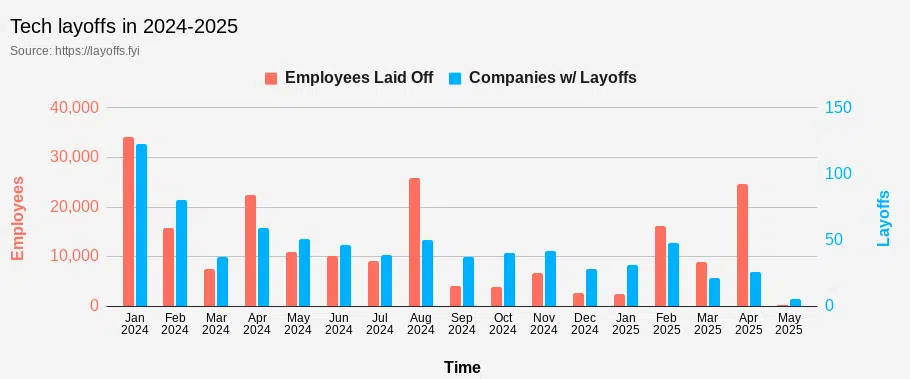When Intel Corporation announced its plan to cut more than 21,000 jobs last month, it delivered a large helping of deja vu on the wave of tech job cuts and layoffs since 2023.
In the Bloomberg report revealing the planned layoff, newly appointed CEO Lip-Bu Tan explained that it was part of a bigger strategic plan.
He said it is to rebuild engineering talent, overhaul manufacturing processes, and restore the company’s financial health.
While this is happening in the semiconductor industry, there’s also a replication in other tech sectors.
But how has that reality shaped out so far in 2025, and what does it mean for the African tech workforce?
Understanding the Layoff Wave in Africa’s Tech Industry
First, on a global scale, 52,340 tech employees have been laid off in 2025 from 123 tech companies, according to Layoffs.fyi, an independent layoffs tracker.

Even though these layoffs are happening globally, they still affect workers in Africa, just like in past waves of job cuts. For example, back in February, Meta announced another round of layoffs that impacted 3,000 employees across Africa, Europe, and Asia.
On a closer look at each month, these include:
| MONTH | EMPLOYEES LAID OFF | KNOWN COMPANIES INVOLVED |
| January | 2,403 | Stripe, Amazon, SolarEdge Technologies, Wayfair, Meta and Textio. |
| February | 16,234 | Workday, Salesforce, Sonos, Sprinklr, and Vendease. |
| March | 8,834 | Northvolt, Block, Brightcove, Acxiom, Siemens, Sequoia Capital, Hello Fresh, Otorio, Tiktok, and D-ID. |
| April | 23,400 | NetApp, Electronic Arts, Expedia, Meta, Cars24, Intel, GM, Zopper, Turo, Forto, GupShup, Canva, Automatic, Wicresoft, Microsoft, Google, and Five9. |
Within the first few weeks of May, companies like Match, CrowdStrike, General Fusion, Deep Instinct, and Beam have also announced layoff rounds.
Even though some companies continued to lay off workers in 2025, the numbers were much lower than those in 2024 and 2023.
Several factors might explain why layoffs are slowing down, but one apparent reason is that many startups are becoming more cautious.
After making the mistake of hiring too many people too quickly in the past, they’re now being more careful with how they build their teams.
At the same time, we’ve seen a steady rise in the use of AI across Africa.
So, while it might be too much to say AI alone is causing job losses, it’s possible that AI is playing a quiet role by replacing roles before they even open up.
In other words, fewer job opportunities may exist today because companies initially design their systems with automation in mind.
Other Factors that Could Drive Layoffs…
A mix of local and global problems is causing layoffs in Africa’s tech industry:
1. Funding Slowdown
African startups rely heavily on venture capital (VC) funding.
But for 2025, Techpoint Africa reports that global investors have become more cautious. In Q1 2025, African startups pulled in $460 million from deals worth $100,000 and above (excluding exits). That’s a 5% dip from Q1 2024’s $486 million.
However, Q2 is already picking up positively, as over 39 startups across the continent secured $343 million in April alone.
2. High Operating Costs
Tech companies in Africa often face challenges like poor internet infrastructure, power outages, and high taxes. These drive up costs, making layoffs more likely when revenues fall.
For example, in January, when Stripe announced laying off 300 people in a leaked memo, Chief People Officer Rob McIntosh said the cuts were happening because it “became clear there were several team-level changes needed” to ensure Stripe had “the right people in the right roles and locations to execute against” its plans.
3. Failed projects
Also, when companies announce layoffs, they often use vague language like “restructuring for greater efficiency” or “realigning strategy.”
These terms can sound polished, but they usually obscure the actual reasons, such as shrinking budgets or failed projects.
This month, Beam, a UK-based climate tech startup, closed its operations. According to Sifted, this came just months after it had revealed big plans to grow.
The company’s Head of Talent, James Reynolds, shared a LinkedIn update stating that around 200 staff members were laid off.
Analysis of Layoff Trend in 2025
Some business leaders are exploring ways to use AI to handle parts of human jobs, but right now, AI isn’t advanced enough to take over most roles fully.
In fact, the wave of layoffs in the tech industry isn’t mainly because AI is replacing workers.
What’s really happening is that large tech companies are changing their focus. That is, cutting spending in certain areas so they can put more money into others.
Although AI can’t completely take over most jobs yet, it’s becoming clear that companies see it as a tool to work faster and reduce team sizes.
Jobs that involve tasks AI can easily assist with (think data sorting, basic writing, or customer support) may not be as in demand in the future.
Employees who don’t learn to use AI tools might struggle to stay competitive in the workplace.
As career coach Marie G. McIntyre explains, “Layoffs aren’t about getting rid of you, but the position. It’s about you figuring out what the right next step is for you.”
What This Means for the African Tech Workforce
Now more than ever, looking at things from a fresh perspective makes sense.
Instead of saying, “AI is fueling massive layoffs,” consider that AI is changing the type of work companies need done.
According to the US Bureau of Labor Statistics, careers that will continue to grow as AI adoption increases include data science, Machine learning, software engineering and development, product management, and marketing.
The report says these careers will increase the number of careers in artificial intelligence by 21 percent from 2021 to 2031.
The African tech workforce is young, ambitious, and creative.
With the right investment in education and digital infrastructure, thousands of young Africans could be re-trained to build, not just use, the next wave of AI tools.
Tech hubs like Andela, Decagon, and ALX already offer AI and data science tracks.
Even free learning platforms like Coursera, Udacity, and Google’s AI for Africa program are helping to bridge the skills gap.
While some tech jobs are vanishing, others are booming.











